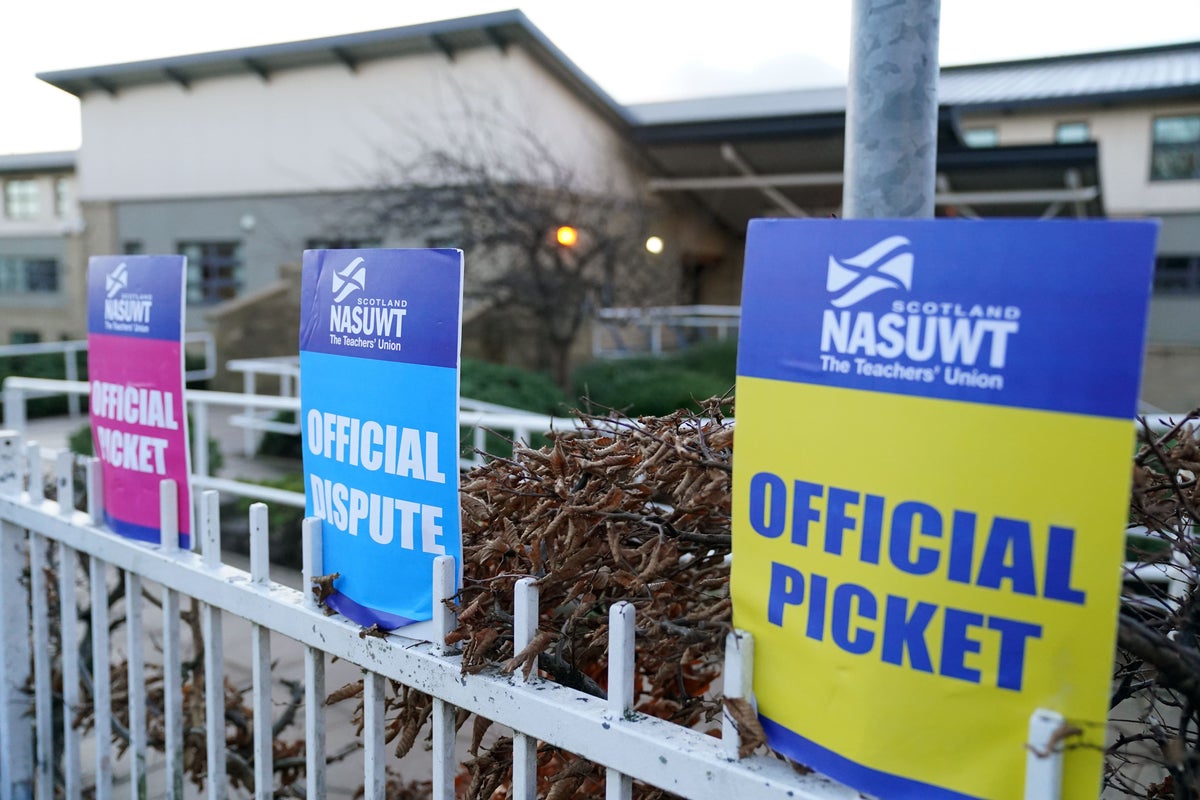
Teachers in Scotland have announced further strike plans in their dispute over pay, with union leaders insisting a “substantially improved” offer is needed to bring an end to the action.
The NASUWT union announced more strike dates for its members, who will take part in protests on Tuesday February 28 and Wednesday March 1.
The EIS, Scotland’s largest teaching union, has already declared strike action on those dates, with both primary and secondary schools across the country to be affected by the nationwide walkout.
The NASUWT meanwhile, said there was still a “window of opportunity to avert further strike action” – but added that “the ball is very much in the court of ministers and employers”.
The comments came amid talks between unions, the Scottish Government and Cosla in a bid to resolve the ongoing dispute.
The pay offer on the table would see most teachers receive a 5% wage rise, though some lower paid teachers would get a 6.85% increase.
However, unions are demanding more than that, with the EIS campaigning for 10% while the NASUWT wants a 12% pay rise – arguing this is needed after previous years of below inflation pay awards.
As well as joining the two national strike days, NASUWT members will continue with other forms of industrial action by, for example, refusing to cover for absent colleagues.
Union general secretary Patrick Roach said it was the “resolve” of union members who “solidly support” the action that had “brought ministers and employers back to the table over recent weeks to discuss pay”.
He stated: “We have continued and will continue to talk with ministers and employers in a bid to resolve this dispute, but the reality is that for all of the discussions over recent weeks, an improved offer has yet to be made.
“If ministers hope that teachers will give up the fight for a better deal on their pay they should think again.
“Teachers know they are worth more than yet another real-terms pay cut and it is beyond time that ministers and Cosla recognised that too.”
Mike Corbett, NASUWT national official for Scotland, said: “We have been clear to Scottish Government and Cosla that with CPI inflation still at 10.5% – more than double the 5% pay award which most of Scotland’s teachers were offered – a substantially improved pay offer which is fully funded by the Scottish Government must be tabled without delay.”
He added: “There is a window of opportunity to avert further strike action, but the ball is very much in the court of ministers and employers.”
Friday’s meeting of the Scottish Negotiating Committee for Teachers (SNCT), which brings together the Scottish Government, local authority leaders in Cosla and trades unions, comes after Nicola Sturgeon told MSPs there is a “gap” between the unions’ demands and “what is affordable”.
The Scottish First Minister stressed “further compromise” would be needed to bring an end to the dispute.
However, the EIS, Scotland’s largest teaching union, has insisted its action will continue until a “substantially improved” pay offer is received.
The union is mounting a rolling programme of strikes, with teachers in Angus and East Dunbartonshire taking part in the protest on Friday.
EIS general secretary Andrea Bradley said: “The reality is that our members are not prepared to accept the sub-inflation 5% that has repeatedly been offered, and only a substantially improved offer from the Scottish Government and Cosla can end this dispute.
“Strike action will continue until that improved offer is on the table for our members.”
Education Secretary Shirley-Anne Somerville said Friday’s talks had been “constructive”.
Speaking after the discussions ended, Ms Somerville stated: “Dialogue remains focused on potential areas for compromise in bringing this dispute to an end – rather than tabling a new offer at this time.
“The Scottish Government values the hard work that our teaching workforce puts in for our learners and we remain absolutely committed to ensuring they receive a fair pay deal.
“Strikes in our schools are in no one’s interest – including for pupils, parents and carers who have already had to deal with significant disruption over the past three years. I continue to urge teaching unions to reconsider current industrial action while talks are ongoing.
“We hope that these discussions will continue to progress towards a compromise to ensure a sustainable deal for all involved.”







